|
|
|
Sort Order |
|
|
|
Items / Page
|
|
|
|
|
|
|
| Srl | Item |
| 1 |
ID:
145579


|
|
|
|
|
| Summary/Abstract |
The general goal of the present study is to analyze whether children with siblings lag behind their only-child counterparts in terms of health and nutrition, cognition and educational performance, and non-cognitive outcomes. We draw on a dataset containing 25 871 observations constructed from three school-level surveys spanning four provinces in China. The analysis compares children with siblings and only children aged 9 to 14 years old in terms of eight different health, cognitive and non-cognitive indicators. We find that with the exception of the anemia rate, health outcomes of children with siblings are statistically indistinguishable from those of only children. In terms of cognition, children with siblings performed better than only children. Moreover, outcomes of children with siblings are statistically indistinguishable from those of only children in terms of the non-cognitive outcomes provided by measures of anxiety. According to our results, the same general findings are true regardless of whether the difference between children with and without siblings is disaggregated by gender.
|
|
|
|
|
|
|
|
|
|
|
|
|
|
|
|
| 2 |
ID:
168352
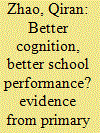

|
|
|
|
|
| Summary/Abstract |
Although students in rural and migrant schools in China generally have not performed well, a share of each cohort has been able to thrive in school and to test into academic high school and college. To understand the origins of persistence, specifically, why some students learn more than do others, researchers have identified certain sources of the problem. Few studies, however, have paid attention to the role that low levels of cognitive development of students play in their academic performance. To address this gap, this study focuses on the role that cognition may play in terms of the academic achievement of rural students. We analyze data from more than 10,000 primary school students from private migrant schools in Beijing and Suzhou and from public rural schools in Henan and Anhui, using the Raven Standard Progressive Matrices test. Our results show high rates of developmental delay (about 33% of the students have Ravens scores that are less than one standard deviation lower than an international mean). Further, the rates of delay are large among all subgroups in the study, including rural children who attend migrant schools in cities and those who live in rural areas and attend rural public schools. The results also suggest that the cognition of students is highly correlated with their educational performance and, in fact, is by far the most important factor in their academic achievement.
|
|
|
|
|
|
|
|
|
|
|
|
|
|
|
|
| 3 |
ID:
108187


|
|
|
|
|
| Publication |
2011.
|
| Summary/Abstract |
This article borrows the concept of "metaphorical framing" from cognitive linguistics and uses it to engage cognitive foreign policy analysis (CFPA) with social constructivism. By accounting for the mutual constitution of agents and social structures (on one hand), and the interaction of somatic and social meaning (on the other), metaphorical framing narrows the gap between cognitive and constructivist approaches and enriches them both. Though it claims a "middle ground" between idealism and materialism, constructivism ignores how the shared meanings that constitute actors are embodied, that is, produced by the evolved human body-brain and its situatedness in the world. Metaphorical framing "fleshes out" constructivism, allowing it to theorize the causal micro-foundations of constitutive effects. On the other hand, CFPA brackets the social dimension of meaning. Metaphorical framing accounts for the shared meanings that constitute actors. It explains how these meanings are instantiated in the mind, and how they shape reasoning. Accounting for intersubjectivity in decisionmaking, then, helps CFPA avoid reductionism. While narrowing the gap between two research traditions, metaphorical framing also advances theories of discourse, persuasion, rhetoric, emotion, and decisionmaking. Ultimately, metaphorical framing facilitates theoretically integrative, methodologically pluralist research on the nature and role of meaning in foreign policy.
|
|
|
|
|
|
|
|
|
|
|
|
|
|
|
|
| 4 |
ID:
191002


|
|
|
|
|
| Summary/Abstract |
This study presents the findings of a laboratory-based experiment testing hypothesised processes implicated in the prevention of violent radicalisation through counter-narratives. The central aims of the study were to contribute to counter-narrative theory, whilst highlighting the value of experimental methodologies that can be deployed in this area of scientific enquiry. Two counter-narrative strategies were evaluated against a dominant terrorist narrative. Considering the role of cognition in the processing of narrative-related information, participants’ (n = 150) Cognitive Reflection and Need for Cognition were measured before they were randomly assigned to a narrative that legitimized terrorist violence, one of two counter-narratives, or a control. Returning autonomy to the target by having them actively counter terrorist rhetoric themselves was found to be more effective than offering generic counter-narratives. Notwithstanding the challenges and limitations associated with measuring violent radicalization-related constructs, the findings of the experiment demonstrate the extent to which individuals vary in their susceptibility to violent, terrorist narratives, as well as attempts to counter them.
|
|
|
|
|
|
|
|
|
|
|
|
|
|
|
|
| 5 |
ID:
111473


|
|
|
|
|
| Publication |
2011.
|
| Summary/Abstract |
The literature on cross-cultural negotiation has expanded considerably over the past few decades, but the findings are often ambiguous and sometimes even contradictory. This introduction highlights the critical areas where objections are commonly raised about the relevance of national culture, the applicability of typologies that treat cultures as static, and the problem of ambiguous terminology. It may not be surprising that studies contradict each other given the ambiguity of the national cultural construct and variations in the context of the negotiating situations that are studied. The articles in this issue contribute to deepening our understanding about cross-cultural negotiation processes.
|
|
|
|
|
|
|
|
|
|
|
|
|
|
|
|
| 6 |
ID:
050976
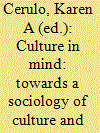

|
|
|
|
|
| Publication |
New York, Routledge, 2002.
|
| Description |
ix, 308p.
|
| Standard Number |
0415929431
|
|
|
|
|
|
|
|
|
|
|
|
Copies: C:1/I:0,R:0,Q:0
Circulation
| Accession# | Call# | Current Location | Status | Policy | Location |
| 047996 | 153/CER 047996 | Main | On Shelf | General | |
|
|
|
|
| 7 |
ID:
132982
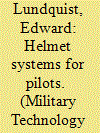

|
|
|
|
|
| Publication |
2014.
|
| Summary/Abstract |
Helmet mounted displays (HMD) help pilots to better harness human sensation, perception, and cognition to enhance their mission performance. They increase tactical capabilities of pilots, aircraft, and weapons as a single, integrated system. The introduction of these new technologies brings about a need to better understand the expectations and limitations of the human brain and its visual and auditory senses to best meld pilot with machine.
|
|
|
|
|
|
|
|
|
|
|
|
|
|
|
|
| 8 |
ID:
047719
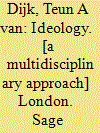

|
|
|
|
|
| Publication |
London, Sage Publications, 2000.
|
| Description |
x, 374p.
|
| Standard Number |
0761956557
|
|
|
|
|
|
|
|
|
|
|
|
Copies: C:1/I:0,R:0,Q:0
Circulation
| Accession# | Call# | Current Location | Status | Policy | Location |
| 043864 | 140/DIJ 043864 | Main | On Shelf | General | |
|
|
|
|
| 9 |
ID:
139115
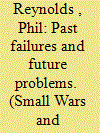

|
|
|
|
|
| Summary/Abstract |
Personal cognitive processes inform how individuals understand their environment. Cultural variation, fundamental attribution error, causal attribution, and durability bias create obstacles to Western understanding of irregular war and have created a significant institutional bias in how the US military perceives its enemies- a perception only somewhat softened after a decade of irregular war. United Special Operations Command (USSOCOM) is in a better position to overcome these problems through persistent engagement. In the event of major conflict, environmentally sensitized military planners will be better able to achieve military and policy objectives.
|
|
|
|
|
|
|
|
|
|
|
|
|
|
|
|
| 10 |
ID:
084081


|
|
|
|
|
| Publication |
Washington D C, Central Intelligence Agency, 1999.
|
| Description |
xxv. 184p.
|
| Standard Number |
1929667000
|
|
|
|
|
|
|
|
|
|
|
|
Copies: C:1/I:0,R:0,Q:0
Circulation
| Accession# | Call# | Current Location | Status | Policy | Location |
| 042152 | 153.4/HEU 042152 | Main | On Shelf | General | |
|
|
|
|
| 11 |
ID:
143674
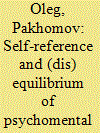

|
|
|
|
|
| Summary/Abstract |
This work is an attempt to describe the reproduction of ethnic/national boundaries as a closed self-referential cognitive process that reproduces itself from itself. It describes some aspects of how this complex interrelation between cognitive structures and the formation of ethnic/national groups functions on the example of ethnic policies of ‘social harmony’ on the Northeast China and ‘national unity’ in the Russian Far East. The article shows how ethnic policies in both countries demonstrate the inability to provide either harmony or unity. However, these disappointed expectations return into national discourse as political ideologies that help preserve the government’s legitimacy, legitimacy of the idea of nation/ethnicity and motivate the society to continue the nation-building process.
|
|
|
|
|
|
|
|
|
|
|
|
|
|
|
|
| 12 |
ID:
175132


|
|
|
|
|
| Summary/Abstract |
Money objects, from coins to bitcoins, are used in economic exchange as a way of putting a number on the fuzzy concept of worth or value. They are inherently dualistic in that they combine the properties of abstract numbers with the properties of owned objects. As a result of this duality at its core, the money system exhibits the properties of a macroscopic quantum system, including entanglement, indeterminacy and interference, with money objects playing a special role as a measurement device. This article argues that, by virtue of its dualistic nature, money acts as a vector of transmission that scales up the properties of quantum mind to the global level. By bringing money back into the picture and providing an alternative to the mechanistic vision of mainstream economics, quantum social science promises to change the way we see and treat the economy, with implications for international relations and security.
|
|
|
|
|
|
|
|
|
|
|
|
|
|
|
|
| 13 |
ID:
137677


|
|
|
|
|
| Summary/Abstract |
Why can your brain store a lifetime of experiences but process only a few thoughts at once? In this article we discuss “cognitive capacity” (the number of items that can be held “in mind” simultaneously) and suggest that the limit is inherent to processing based on oscillatory brain rhythms, or “brain waves,” which may regulate neural communication. Neurons that “hum” together temporarily “wire” together, allowing the brain to form and re-form networks on the fly, which may explain a hallmark of intelligence and cognition: mental flexibility. But this comes at a cost; only a small number of thoughts can fit into each wave. This explains why you should never talk on a mobile phone when driving.
|
|
|
|
|
|
|
|
|
|
|
|
|
|
|
|
|
|
|
|
|